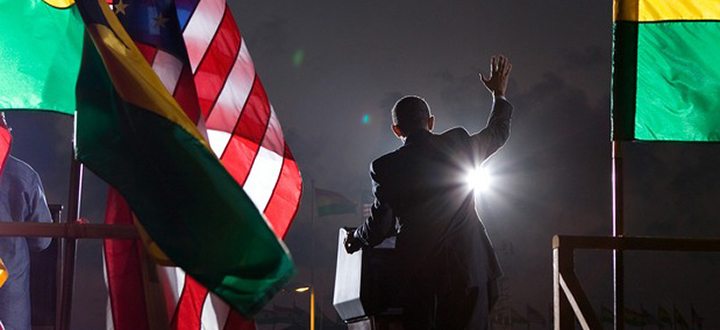The invitation of Africa’s leadership to Washington, D.C., this August for the U.S.-Africa Leaders Summit is an important signal that the Obama Administration intends to improve America’s standing in Africa. And that’s good news—Africa represents a vast reserve of untapped resources: mineral, fossil, biological, and human.
It is too easy to oversimplify the opportunity ahead as a great race to prevent China from monopolizing Africa’s treasures. I am personally motivated to see other companies and governments assume a greater role in Africa, not because I wish others to monopolize Africa’s treasures in place of China, but because my experience has shown that many U.S. and European entities invest in Africa with some sense of obligation to deliver positive social impact alongside business value.
Since 2008, I have logged close to 120 days in numerous ports of call across sub-Saharan Africa. My travels have brought me from Angola, Ghana, and Guinea, to Ethiopia, Mozambique, South Africa and, most recently, to Sierra Leone. I fear I am nothing more than another businessman on a quick turnaround itinerary, but I have had the chance, in a relatively brief time, to observe firsthand the dramatic changes taking shape in many different corners of this vast continent.
I have relished this journey with some irony, as for many years, I counted myself a Latin America and Asia expert—not because of any linguistic capacity, but because I somehow missed the Africa itch earlier in my career. I am so glad I have matured with time.
The scale of the continent; the variety of landscapes, languages, and people; vitality and youth mix with tradition and malaise. I quickly learned there is no better place in which to facilitate balanced and inclusive private sector-led development—nor really any better place in which to gain a new perspective on your own place in the grand scheme of things.
Africa, the home of humanity and so much else, has been a crossroads for millennia. And yet, most of the continent has missed out on the progress other regions have enjoyed over the past 100 years of remarkable technological innovation and economic growth. Since the 18th century, more-powerful nations have staged a global game, reliant on borders and stable governments for success in trade. The modern map of sub-Saharan Africa only began to take shape from 1950 onward, largely as a result of colonial rule. People are only a few generations into thinking of themselves as Sierra Leonean, or Angolan, or Zambian, and most maintain a deep connection with their tribal ethnic roots. Such dynamics are often subtle yet complex, especially to the undiscerning American eye. What’s more, they have significant implications for the business climate in sub-Saharan African markets.
Where to Begin in Africa
In preparing American corporate leaders for a first experience in an African country, my primary focus is exactly this; how little any of us know about African cultures. Traveling to Mozambique, Equatorial Guinea, Senegal, and Kenya on a single itinerary, for example, will require navigation of four or five official languages, more than 50 regional dialects, and three to four major religions. I quickly aim to disabuse my listeners of the fear of the unknown, a rush to read all that Wikipedia has to offer on the people in a given country, or a wish not to offend the people they will meet. Going in curious, interested, and reminded that we all have two ears and only one voice box is the best recipe for success in any new locale. In Africa, particularly when working across multiple countries, local traditions and customs require that we Westerners, who are so used to being heard, speak more carefully, listen more often, and, recognize that there’s much to be gained in demonstrating personal respect, no matter the differential in economic, political, or military might.
Many cultural subtleties warrant curiosity—which in turn will reveal fascinating aspects of human history. Ask a Sierra Leonean about her country’s history and why the capital is called Freetown. Try to understand how Ethiopia, mountainous to a fault and south of deserts in Sudan and Egypt, is home to so many Orthodox Christians, but be prepared to learn that the nation’s nearly-majority Muslim population finds the notion of Christian majority a bit overdone. Wonder aloud to Ghanaian hosts about the plethora of Chinese restaurants in Accra, and ask whether they have just arrived with the Chinese construction workers. Do not hesitate to speculate why there are so many Lebanese in West Africa and South Asians in East Africa. Do Liberians on the one hand or Tanzanians on the other count these fourth-generation immigrants as fellow citizens?
“If anything can come of the Summit in Washington, I truly hope U.S. leaders who are invited to participate will take note of how much Americans have to learn from African nations and their people.”
With our shared, if scarred, history, the United States and Africa have a page to turn in the balance of the 21st century. If anything can come of the Summit in Washington, I truly hope U.S. leaders who are invited to participate will take note of how much Americans have to learn from African nations and their people. By arriving at that simple realization of our own accord, I know Africa’s leaders can return home with a sense of accomplishment. I only hope to be fortunate enough to witness all that this new opportunity will have to offer.
Feature photo courtesy of the White House
Harry Pastuszek
As the Vice President for Enterprise and Community Development at PYXERA Global, Harry works to efficiently join business and international development strategies to benefit enterprise and community development. Prior to joining PYXERA Global in 2012, he worked for Bechtel Corporation and The World Bank Group’s International Finance Corporation.


Pingback: New Global Citizen’s Best Stories of the Year